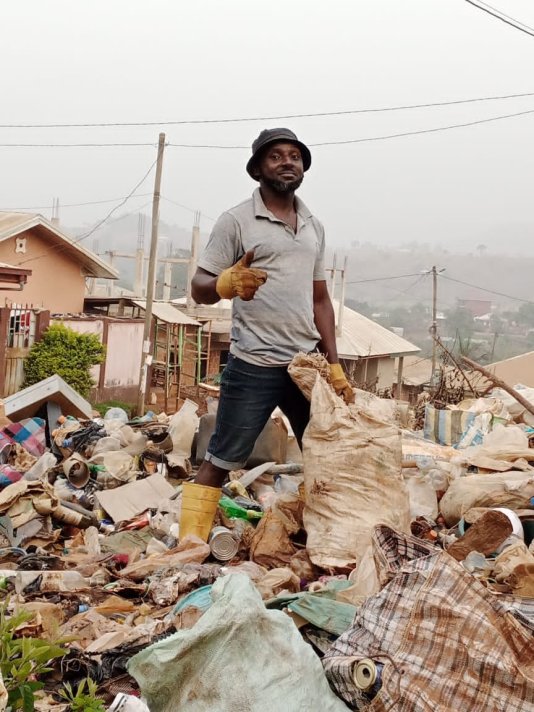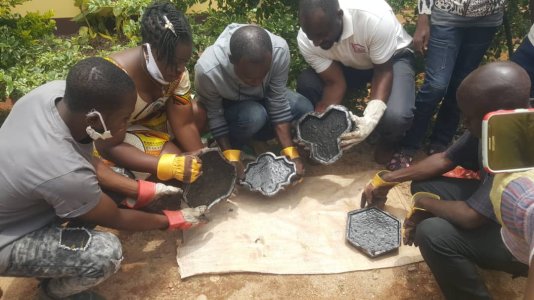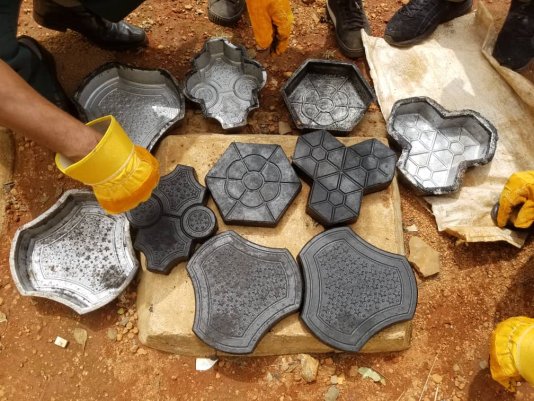- About
- Topics
- Picks
- Audio
- Story
- In-Depth
- Opinion
- News
- Donate
-
Signup for our newsletterOur Editors' Best Picks.Send
Read, Debate: Engage.
| December 07, 2022 | |
|---|---|
| topic: | Pollution |
| tags: | #Cameroon, #water pollution, #plastic pollution, #recycling |
| located: | Cameroon |
| by: | Akem Olives Nkwain |
On the heels of this year's COP27 in Sharm el-Sheikh, Egypt, Tata Elvis, a waste recycler from Bamenda, Cameroon, said "Though these high-level meetings can spur climate action, much can only be achieved if everyone, everywhere takes action."
"We’ve looked at issues around tackling climate change to be something which has to be done by someone else for too long," Tata added. "The time for action is now."
Antonio Guterres, the United Nations (UN) Secretary General, conveyed similar sentiments, warning that the world as a whole needs to take urgent climate action.
"We’re on a highway to climate hell with our foot [constantly] on the accelerator," Guterres said addressing leaders at COP27. "Our planet is fast approaching tipping point that will make climate chaos irreversible."
Tata from Bamenda said that, as he views it, 'going green and clean' is the only way out. "I always tell people: let’s go green and clean together [and make] our communities sustainable."
According to the waste recycler and climate activist, 'going green' entails persevering biodiversity, while 'going clean' involves effectively managing waste and, to a larger extent, making it a resource through recycling.
"My journey into recycling waste into other byproducts began right in infancy," Tata told FairPlanet. "My parents tell me today that I used to gather lots of discarded objects and tried making articles out of them."
His passion for using waste as a resource had stayed with Tata through his graduation from university, after which he founded Cameroon Youth for Sustainable Development and Environmental Protection (CAYSDEP).
Through this NGO, Tata and his team members are contributing their part to tackling the climate emergency through awareness-building around waste, waste management and recycling.
Speaking to FairPlanet, Tata exhibited some organic charcoal made from cow dung and maize cobs, fuel distilled from plastics, liquid gold made from e-waste, Aluminum ingot made from crushed waste cans and pavement tiles constructed plastics.
In 2020, the World Bank estimated that 2.24 billion tonnes of solid waste was generated that year alone - which amounted to a footprint of 0.79 kilograms per person per day.
The report further highlighted that with rapid population growth and urbanisation, annual waste generation was expected to increase by 73 percent from the 2020 margin to about 3.88 billion tonnes in 2050.
In Cameroon, daily generation of waste stands at 16,000 tons, amounting to about 5.5 million tons annually. Most of the waste is generated in towns across the nation.
In Tata's home town Bamenda, which is located in the Northwest Region, heaps of discarded waste on access roads are a common sight. "With the rise in urbanisation and population growth, waste like this will always be a disaster if a management and recycling system is not put in place," he said, echoing the World Bank's findings.
Nestled in scenic volcanic highlands, Bamenda is one of the towns with the highest number of English-speaking Cameroonians and serves as a trade and export centre for local agricultural products.
Since 2016, the town has been experiencing an armed conflict codenamed the Anglophone Crisis - a conflict between Cameroon’s government and separatist movements clamouring for a breakaway state called Ambazonia.
As FairPlanet’s team drove through Bamenda's streets, piles of waste could be spotted in dumpsites at major road junctions and sent a stench up the air that was difficult to ignore. Before 2016, waste was regularly collected by the household waste collection firm Hysacam.
Sadly, Hysacam's activities were halted due security threats and a lack of access to dumpsites as a result of the armed conflict; this situation has generated a waste pollution problem in the one-time 'cleanest town.'
But the foul odor and blocked roadways are not the only problems associated with Bamenda's swelling waste crisis - as it also has less conspicuous impacts on residents' health and on the environment, Tata said.
Both the global climate and infrastructure are directly impacted by plastic waste. Furthermore, plastics and other waste products that end up in local water sources clog drains and contaminate drinking water. Areas of land pollution also become breeding grounds for pests, such as rats, which flourish in dirty environments, according to Environmental Group, Inc.
Like Tata, many other Cameroonians are venturing into the recycling of waste. Penn Sylvanus Muluh, a 24 year-old photographer, told FairPlanet that his involvement in waste management began when he covered a sensitisation campaign on plastic pollution.
"Waste management wasn’t my area of interest, but when I got to the field, the amount of plastics I saw got me thinking," he said. "Immediately after that day, I did research on how to transform plastic into bricks."
"Today, I’m able to make pavement bricks and flower jars of all sizes from plastics," he added. "This goes a long way to save our planet and help me generate income."
But despite the gains made by Cameroonians trying their luck in recycling waste, the sheer amount of waste generated daily often overwhelms them, as most of them rely on artisanal methods of waste management and recycling.
Cameroon produces approximately 600,000 tonnes of plastics daily, of which only about 20,000 tonnes end up being recycled by the few ventures involved in the collection, recycling and transformation of plastics. By simple arithmetic - a whooping 40,000 tonnes are deposited into the environment.
Muluh further said that with such an amount of discarded plastics, machines are required to effectively transform all of them into other valuable products.
Unfortunately, start-ups like Tata and Penn's cannot afford heavy-duty equipment - which is why most waste management and recycling projects in the country are unsuccessful.
Despite the seemingly insurmountable scope of Cameroon's waste problem, Tata believes that awareness-building around the issue of waste is key in tackling the crisis on the local level.
"We need to teach the population how to sort and segregate waste, identify who and where to dispose of it, as well as encourage all to recycle - even if it’s just about recycling biodegradable waste into byproducts like manure for soil enrichment," he said.
The impacts of proper waste management are far-reaching, as it decreases greenhouse gas emissions and preserves energy. It also helps cities become more resilient to extreme climate occurrences. Hence, if encouraged and espoused, solid waste management in particular will lead to the realisation of some of the sustainable development goals, according to the World Bank.
A new UN report found that "the past eight years were the eight hottest ever recorded," while the UN World Meteorological Organization (WMO) estimates that in 2022 alone, average temperatures were about 1.51 °C above the pre-industrial average.
Alarmed by the global rise in temperatures, Tata said that his organisation has transitioned from focusing exclusively on recycling waste to educating people on the impacts of global warming on our planet and the importance of taking immediate action.
Africa, where Tata hails from, accounts for only four percent of global greenhouse gases emitted from waste - compared to 80 percent generated by wealthy nations.
Tata said he would have folded his arms and waited for them to take action and save his continent. However, he said that a crisis affecting "our planet anywhere, affects everyone."
This is why Tata opted to take the bull by the horn in combating climate change. "We have just one planet," he said. "Saving it, be it from Mile 5, Nkwen-Bamenda [...] or somewhere else in Asia, should be the ultimate goal, and that’s my prime motivation.
"I want to bequeath a safe and fair planet to succeeding generations."
"Saving our planet through proper waste management and recycling is a cause that requires the contribution of all," he added. "Solidarity is and should be the watchword."
Tata regrets that, unlike other socioeconomic ventures where financing is readily available, most climate change and waste management actions attract little or no finance - which hampers his activities.
"Since 2016 when we began our activities, we’ve operated on self-funds [sponsorship]," he said. "Most financial institutions see climate change actions as not being urgent, and often ask us to wait like forever with no response."
According to the UN, "financial and sound investment in climate [related] actions is a necessity," - as they will go a long way to "reduce emissions, promote adaptations to the impacts already occurring and build resistance."
"The benefits that flow from these investments, however, dramatically outweigh any upfront costs," stressed the UN.
Tata noted that investments will enable him to move from artisanal to mechanised or industrial recycling of waste. "For example, it takes us close to a month to mold 1,000 pavement tiles from plastic waste," he said. "Just imagine how many tiles we will produce in one hour if we have a mechanised mold - many, right?" Tata quizzed with a broad smile.
According to the World Bank, though costly, investments in waste management projects will spur citizen engagement, bring about behaviour change and increase public participation in existing functional waste systems, promote environmentally-sound waste disposal - which would reduce waste disposal in waterways, address debris management and safeguard infrastructure against flooding.
Image by Ernest Mige.
By copying the embed code below, you agree to adhere to our republishing guidelines.



